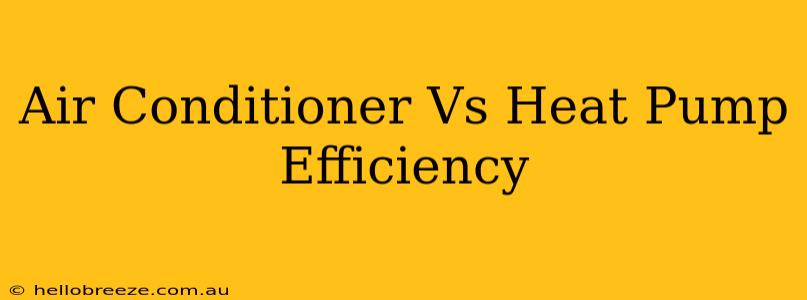Choosing between an air conditioner and a heat pump can be tricky. Both cool your home, but their heating capabilities and overall energy efficiency differ significantly. This in-depth comparison will help you decide which system best suits your needs and budget.
Understanding the Basics
Before diving into the efficiency debate, let's clarify what each system does:
-
Air Conditioners: These systems are designed solely for cooling. They extract heat from your home and release it outside, lowering the indoor temperature. They are generally less expensive upfront than heat pumps.
-
Heat Pumps: These are highly versatile systems that can both heat and cool your home. During cooling, they function similarly to air conditioners. During heating, they extract heat from the outside air (even in cold temperatures) and transfer it inside, significantly reducing energy consumption compared to traditional electric resistance heating.
Efficiency: The Key Differentiator
The core difference lies in efficiency. We'll explore this using several key metrics:
Seasonal Energy Efficiency Ratio (SEER)
SEER measures the cooling efficiency of air conditioners and heat pumps. A higher SEER rating means more cooling output per unit of electricity consumed. Air conditioners typically have SEER ratings ranging from 13 to 20, while heat pumps can achieve even higher SEER ratings, often exceeding 20. A higher SEER rating translates to lower energy bills.
Heating Seasonal Performance Factor (HSPF)
This metric is crucial for comparing heating efficiency. HSPF is only relevant to heat pumps, as air conditioners don't provide heating. A higher HSPF indicates greater heating output per unit of energy used. Heat pumps with HSPF ratings of 9 or higher are considered highly efficient.
Operating Costs
While upfront costs might favor air conditioners, long-term operating costs often tilt the scales towards heat pumps, particularly in regions with milder winters. Heat pumps can significantly reduce your heating bills, making them a cost-effective choice over time. The overall savings will depend on your climate and energy rates.
Climate Considerations: Where Each System Shines
The optimal choice depends heavily on your climate:
-
Mild Climates: Heat pumps excel in regions with mild winters. They can efficiently heat your home even in temperatures down to the low teens Fahrenheit (around -10°C), resulting in substantial energy savings.
-
Cold Climates: While heat pumps are becoming increasingly effective in colder climates, their efficiency can decrease in extremely low temperatures. In areas with harsh winters and prolonged periods of freezing temperatures, a traditional heating system (like a furnace) might be necessary in conjunction with a heat pump, or a dedicated cold climate heat pump might be a better option. In such cases, an air conditioner might be the most cost-effective solution for cooling.
Factors to Consider Beyond Efficiency
-
Upfront Costs: Heat pumps typically have a higher initial investment cost than air conditioners.
-
Installation: Professional installation is essential for both systems to ensure optimal performance.
-
Maintenance: Regular maintenance is important for both to maximize efficiency and longevity.
-
Home Size and Insulation: The size and insulation of your home will influence the appropriate system size and efficiency. A well-insulated home will benefit more from a heat pump's efficiency.
Conclusion: Making the Right Choice
Choosing between an air conditioner and a heat pump is a significant decision impacting your comfort and energy bills for years to come. Carefully weigh the factors discussed above—your climate, budget, and long-term energy costs—to determine the best system for your individual needs. Consult with a qualified HVAC professional to receive personalized recommendations based on your specific circumstances. They can assess your home's requirements and help you choose the most efficient and cost-effective system.

